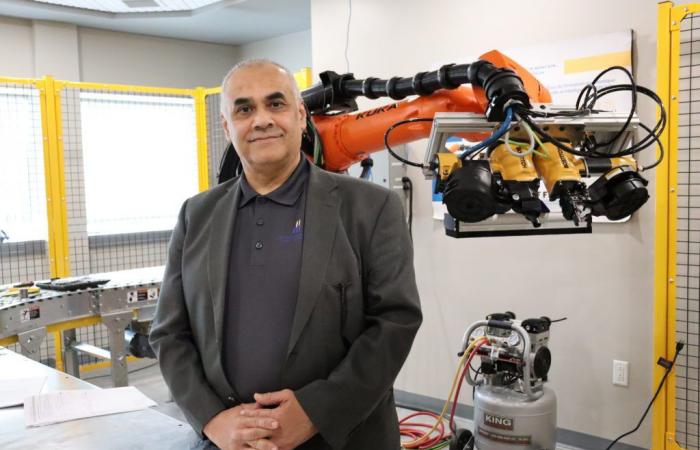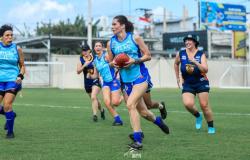Sid Ahmed Selouani, vice-rector of the University of Moncton at the Shippagan Campus (UMCS), officially ends his 10-year mandate on July 1.
The few cardboard boxes at the entrance to his office bear witness to his imminent departure. He is happy to leave this position with results that he considers positive.
The vice-rector remains within the UMCS and returns to his tasks as professor-researcher.
His experience on Acadian soil dates back to 2002 when he arrived at UMCS as a professor of information management. “I worked there as a researcher also within the program,” he says.
In 2012, he became dean of studies at UMCS, a position he held for a few years.
After the departure of Jocelyne Vienneau, who became lieutenant governor of New Brunswick in 2014, the Algerian native accepted the position of interim vice-rector. He was officially appointed a year later.
During his first mandate, he tackled the issue of cohabitation of the UMCS and the New Brunswick Community College (CCNB).
It was the biggest project he had to carry out. Construction, which began in 2017, took place during school hours.
“I will not hide from you that the noise, the management of the construction site while we had study sessions, it was a very big challenge. It was almost miraculous that we were able to do it during academic and para-academic activities.”
He is extremely proud of the result which allowed significant savings.
“It’s a real gem,” he says, “because it revolves around knowledge and everything that is knowledge. We cannot develop if we do not have an institution. We are lucky to have a local institution like that. We will have to take care of it and continue its development which is far from finished.”
Since taking charge of the campus, he says he has received “extraordinary” support from the community which, according to him, also has the institution at heart.
“It’s like a duty to meet the community’s expectations, because it hasn’t been easy already to set up the campus here, then to make it prosper.”
He remembers that at the time, almost all the mayors went with him to Fredericton to plead the cause of the cohabitation of the CCNB and the UMCS.
“The development of the human being is the most important thing. Even more than the development of infrastructure or hardware. That’s what was the common thread.”
Good cards
In his opinion, the UMCS has come a long way to have a recognized quality of teaching and research.
“We have unique programs in Canada and very dynamic research, very high-quality teaching staff, and state-of-the-art infrastructures. We have all the best.”
“I can tell you that there is not a square foot that has not been renovated. We have the best possible equipment in all disciplines.”
New ideas can always be proposed for academic programming and open the door to new disciplines.
“There are programs that we must continue to have to meet the needs of society today and tomorrow. If you meet a need, young people will come, and that’s what we will have to maintain.”
He cites as an example the bachelor’s degree in sustainable development and coastal zones. “You know, the issues of climate change, we see the impacts every day: coastal erosion, etc. We have a program that addresses these issues.”
“We have a lot of good cards to play. We can say that we have what it takes to meet the needs of young people today. All that remains is to make our programs known and to develop others.”
It seems important for him to also work with the university’s two other campuses. “Strengthen each other to have a Moncton university ready for the challenges of today and tomorrow.”
The future of rural campuses
Sid Ahmed Selouani recalls that the future of university campuses in rural areas necessarily requires support from the community.
“We have a network of secondary schools here which represent a significant pool. Graduates of these schools have the choice of coming here or going elsewhere.”
“If they go elsewhere, we won’t have any students. We will have international students. That’s very good, but we are also a university whose mission is to serve the Acadian community. So, we must ensure that everything that is local, New Brunswick and Canadian Francophonie is also consolidated with the international Francophonie which must be preserved.”
As soon as the pandemic ended, UMCS was able to welcome a record number of 630 full-time students. This year, there were 575.
“We have a model to maintain a number of students based on our reception capacity. We have increased our residence spaces by approximately 40% in recent years,” informs the vice-rector.
Even if the UMCS has contributed to increasing the number of available housing units, this challenge remains very present.
“We have the capacity to accommodate up to 1,000 students. But, because we are in a region where we do not have many housing options, we have to limit ourselves to a smaller number,” he declares.
Discussions are still ongoing to improve the situation.
Limited public transportation options also pose a challenge for UMCS.
“We see our bus running every day. We made our bus available to the Regional Services Commission to demonstrate our commitment to the fact that we would like to have a good public transportation network for our students and that we can expand the housing pool.”
“So we have the capacity to accommodate more students. What restricts us is really transportation and housing.”
Furthermore, the vice-rector is proud to highlight the opening of a new pavilion with an area of 15,000 square feet at the UMCS. This is where he will work after July 1.
The New Brunswick Rural Research Center is housed in this new pavilion, opened two years ago, which is in the same building as Valores.
“We have research laboratories, the industrial robotics and artificial intelligence research hub, fully equipped with industrial robots also in this new pavilion.”
Back to basics
The vice-rector will not have time to be bored. He already works to supervise doctoral and master’s students, technicians and research assistants who require supervision. “I have my research activities which are still ongoing and which require local supervision.”
Their neurons work on several ideas at the same time.
“I am involved in a large industrial robotics and artificial intelligence project to be able to disseminate these technologies within our local small and medium-sized businesses here, to work with industries.”
Interim Vice-Rector
The interim dean of studies at the Shippagan campus, Pierre Philippe Ferguson, will occupy the position of interim vice-rector of the UMCS as of July 1.
By December 2024, the position of vice-rector will be open to competition, and will eventually be filled.






